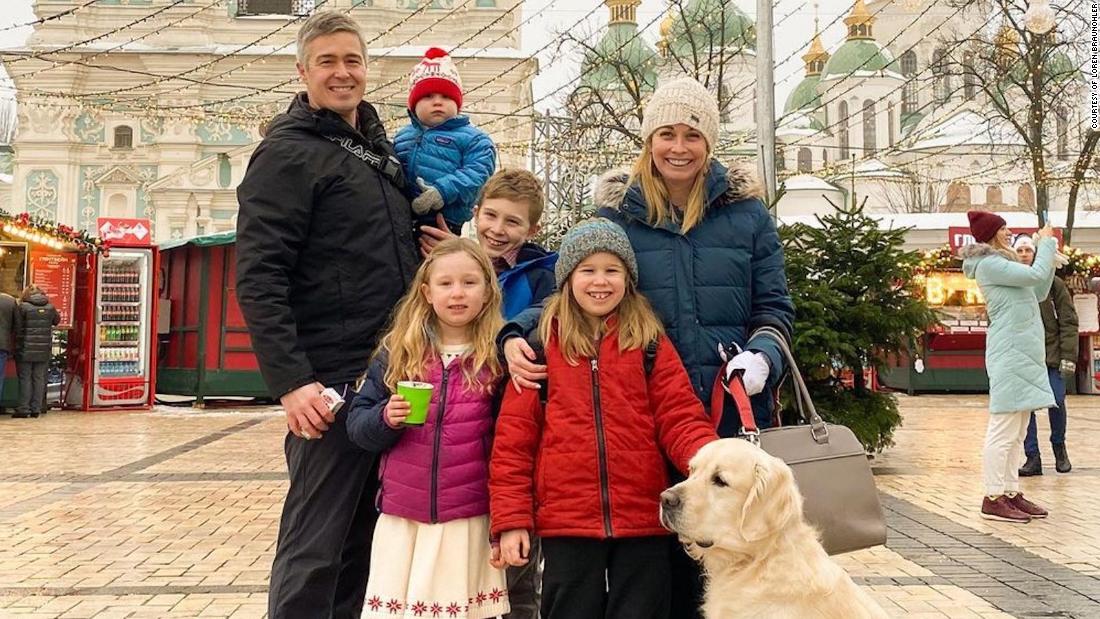Editor’s Note — Loren Braunohler joined the US Foreign Service as a diplomat and has served in Mozambique, Venezuela, Sudan, Washington, D.C. and Thailand. After a decade in the US State Department, she resigned in 2011 to become a stay-at-home mom and travel writer. The opinions expressed here are her own.
Kiev, Ukraine (CNN) — US Foreign Service Officers are a special kind of crazy.
I should know. I was one, and I’m married to one. We move our children, pets and belongings to far flung places across the world every few years.
Depending on where we are located, we can bike the Alps, hike the Himalayas, surf in Sydney or nosh on the world’s best Thai food until we’ve reached our breaking point. On the regular.
Other times, we serve in places where we’re exposed to dengue fever, the plague (yep, it still exists), life in an authoritarian state or a mega-city with alarming levels of pollution.
No matter where we are located, however, the one constant is that the travel opportunities are insane.
Alliances, aperitifs and agrément
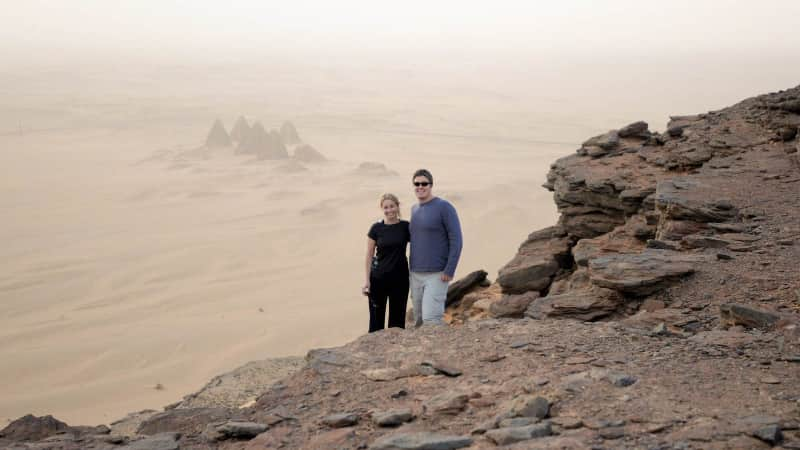
Life before kids: Loren and her husband Walter on a 2008 work trip from Khartoum to the Egypt-Sudan border.
Courtesy Loren Braunohler
Let’s back up for a second. Most people have no idea who Foreign Service Officers are or what they do.
US Foreign Service Officers, or FSOs, are American diplomats.
We meet hated war criminals one day, and revered humanitarian leaders the next. We hop on trawlers alongside Mozambican fisherman to collaborate on conservation.
We meet Darfur rebels in the desert to discuss peace negotiations with the Sudanese government. We help broker peace deals, connect US companies with overseas buyers and help Americans overseas in need.
We progress US foreign policy issues, making clear to other countries where we stand and what we stand for. We are nearly always living and working overseas in US embassies and consulates, and are occasionally on domestic assignment in Washington, D.C.
My husband and I have been at this for 20 years. Combined, we’ve lived in nine countries, learned six languages and resided on nearly every continent (we’re coming for you, Antarctica). I began my career in Mozambique and Venezuela; my husband began his career in Thailand, Iraq and Australia. We got engaged in Venezuela, married in Thailand and honeymooned in Laos. We then served together in Sudan, Washington, D.C. and Thailand.
During this time, I resigned to stay at home with our growing family, which had grown to five. Subsequently, we served in Poland, spent a year in Rhode Island at the Naval War College, where our fourth child was born, and are now serving in Ukraine.
In less than a year from now, we’ll move again. To where? Who knows? But that’s the fun and madness of it all.
The world is your oyster (no really, it is)
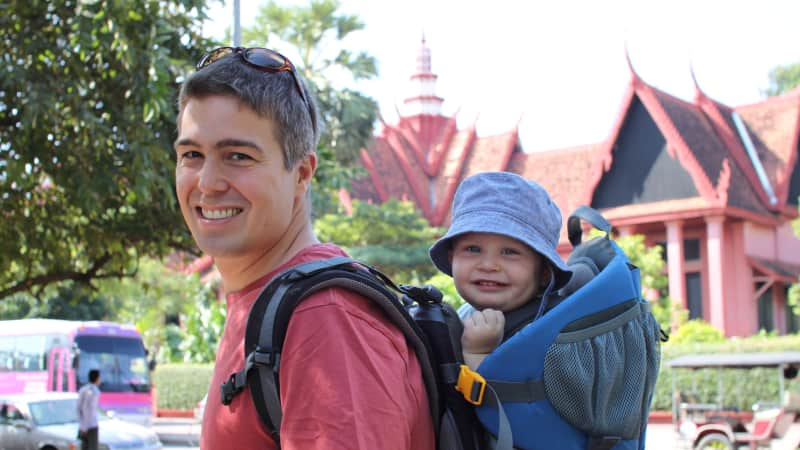
The Braunohlers traveled to Phnom Penh, Cambodia with their first-born son in 2011.
Courtesy Loren Braunohler
Do you get to decide where you go? Well, yes, and no.
An FSO has to be “worldwide available,” meaning, we must be willing to go anywhere the US has an embassy or a consulate.
When I started out, I was given a list of nearly 80 cities around the globe. I had to rank order 25 of them. I ranked Mozambique as my first choice and got it.
Others weren’t as lucky. The poshest location on our list? Oslo. The most difficult? Liberia (it was in the midst of a civil war).
And the amazing thing is that every one of us has a soft spot for something — whether that’s election-observing in countries fraught with corruption or working on a climate change pact with China. Locations almost always get filled without people having to be forced into them.
When you become more senior, you have the chance to lobby on specific positions in certain places … but don’t worry, you’re almost never completely in control of your own fate.
The chaos and the beauty
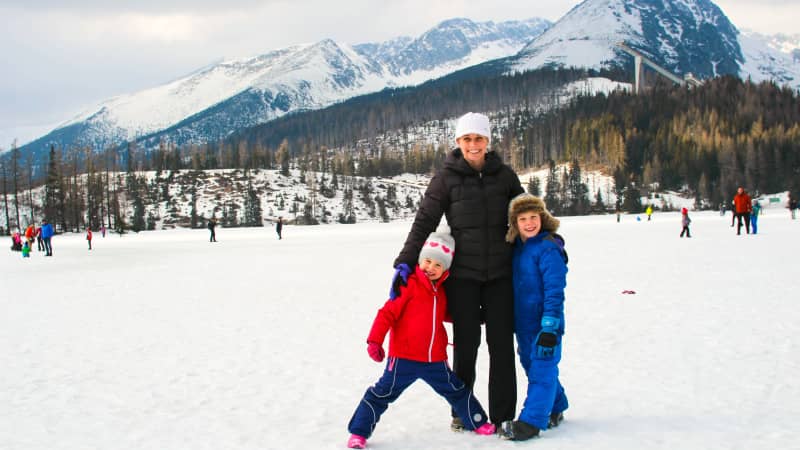
Walking on frozen lake Strebske Pleso in Slovakia in 2018.
Courtesy Loren Braunohler
When we started our careers, my husband and I were both single. Life was simple.
Now we have four kids and one big golden retriever. My kids are pack mules on trips when we relocate: everyone, no matter how strong, little or prone to complaining, pushes an entire cart full of luggage.
Usually there is an infant being worn in a baby carrier. And a 90-pound dog being pushed alongside in a massive crate. And luggage regularly falling off of carts. To say that we are good entertainment value at airports around the world would be an understatement.
In our lifestyle, everything pivots almost all the time. Pivot to a new school. Pivot to a new language. Pivot to a new neighborhood. Pivot to a new home. Pivot to new friends. Pivot to a new sport.
We are constantly buying cars to fit our latest assignment. We’re constantly buying new wardrobes. I just had a friend transfer from India to Ukraine in February. Imagine that climate shock. And the sheer list of vaccinations we need is impressive.
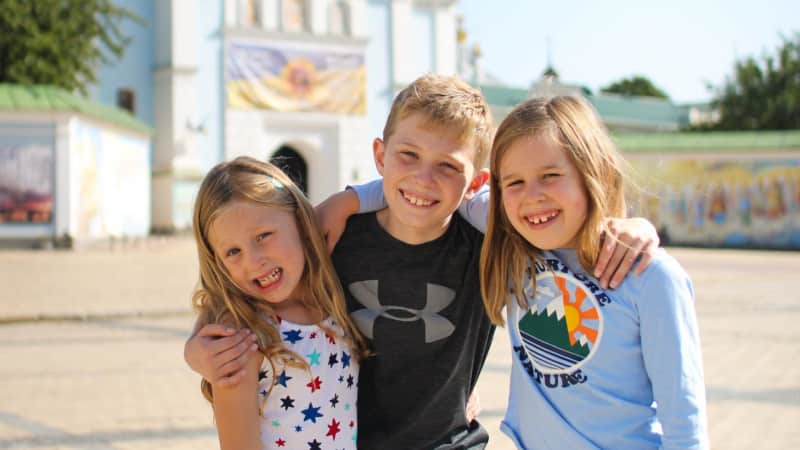
Exploring Kiev’s St. Michael’s Monastery in 2020.
Courtesy Loren Braunohler
During these crazy times of transition, my kids, now ages 11, 9, 7 and 2, have sustained huge changes in their personal and social lives. They have gone from small, private international schools to large American public schools.
They’ve gone from living a life of flip flops and tank tops in the humidity of Southeast Asia to frigid negative temperatures in eastern Europe.
Delicious pad Thai turns to borscht. Swimming pools turn into sledding hills. Jungles into thousand-year old castles. Ever tried to set up a lemonade stand overseas? Good luck with that. Learn. Deal. Adapt. Repeat.
Change is our constant. And constant change gets messy, but there is also a special kind of beauty that comes with it.
My kids’ world is so much bigger than mine ever was at the same age. They see poverty. They see wealth. They see all nationalities, hear different languages, go to school in these languages, and begin to understand and appreciate new traditions and religions.
We’ve had the most amazing travel adventures. We’ve been greeted by eagle rays gliding near the surface of the water as we disembark from a sea plane onto a floating dock in the Maldives. We’ve walked through the rice paddies of Ubud, Bali and searched for fairy houses along the coast of Ireland. We’ve hiked the trails of Hong Kong and visited temples in Phnom Penh. We’ve jet skied the Black Sea off the coast of Ukraine and walked on frozen lakes in the High Tatras of Slovakia.
Unpaid toilets for life
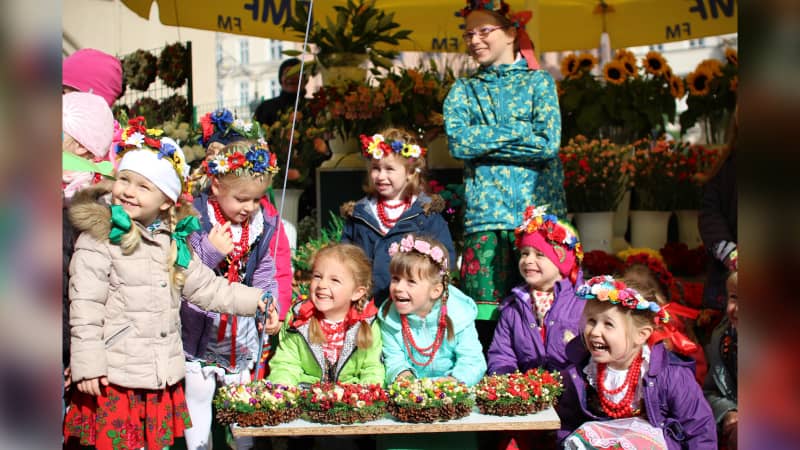
Daughter Kate, in the far right, attends a Polish preschool birthday party in 2016.
Courtesy Loren Braunohler
What do we miss?
We miss home. Real home. Our grandparents. Our cousins. A forever house that is our home. Friends that will go through grade school, middle school and high school with us.
We miss the ease of doing things in our native language. We miss the familiarity of what’s normal and expected. We miss knowing that when we go into a bathroom, we don’t have to pay for the privilege to use it, or that it’s not a hole in the ground.
Little League. Having a mailman. Tap water that you can drink. Good medical care.
So how do we get the kids on board with this state of constant transition?
Our American friends in Benin have adopted the term “adventure family.” Identifying themselves this way gives their kids, ages 6 and 9, a sense that there is purpose behind all of the moves, difficult goodbyes and upheaval: to have adventures and explore together, as a family.
It also gives them an immediate connection to other “adventure families” as they move around the globe.
And then came Covid-19
With the advent of Covid-19, the Foreign Service lifestyle got even more complicated. We moved from the US to Ukraine mid-pandemic, pre-vaccine in the summer of 2020.
We faced massive shipping backlogs, pet transfer centers in European airports were closed, and when we arrived we were not allowed to have contact with anyone from the US Embassy community for weeks.
We were largely unable to explore, meet new people, use public transportation, experience museums or restaurants, or simply see the inside of our children’s new school.
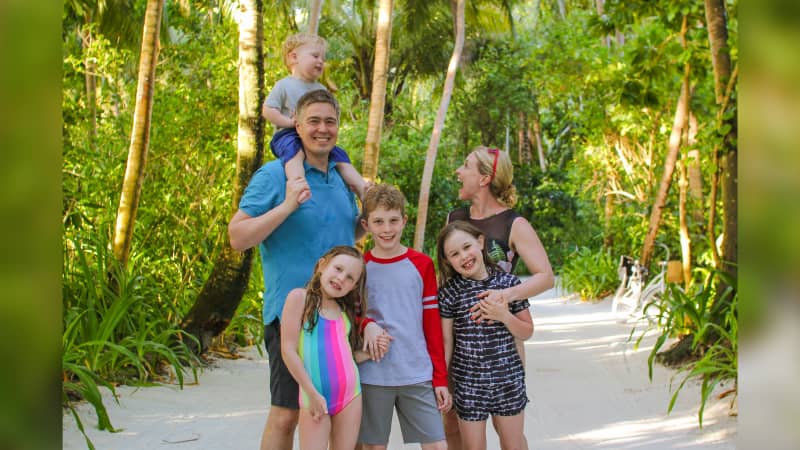
In 2021, the family visited Maalefushi Island in the Maldives.
Courtesy Loren Braunohler
Pre-Covid, our initial intent when moving to Kiev was to jet off to Italy, Spain and other nearby destinations on long weekends. Instead, we explored frozen quarries and forests outside of Kiev during a long Ukrainian winter.
Our friends who moved to Saudi Arabia at the same time with kids, ages 9 and 7, embarked on one big camping trip and traversed the length of Saudi Arabia from the Persian Gulf to the Red Sea by car. Through sandstorms. For spring break. It was an incredible experience for them, and something that never would have transpired had the world stayed open.
I tell myself that this unconventional lifestyle teaches my kids to be more accepting, flexible and to roll with life’s inevitable punches. Perhaps they will see themselves as global citizens and realize there are many ways to live a fulfilling life. Everything doesn’t have to be done the American way.
So yeah, we are certainly a bit crazy. But we are also extremely privileged. We see and experience so many unique corners of this world. We make incredible friends across the globe. We are shaped, hopefully for the better, by our transient lifestyle.
And, we have the liberty to step away from the hard places at the end of the day and receive first-class medical care, live in a free, democratic society, and provide our children with the best possible education.
In the words of J.A. Redmerski, “Sometimes the greatest memories are made in the most unlikely of places, further proof that spontaneity is more rewarding than a meticulously planned life.”
Top image: The Braunohler family celebrates Christmas in Kiev in 2020. Image courtesy Loren Braunohler.
